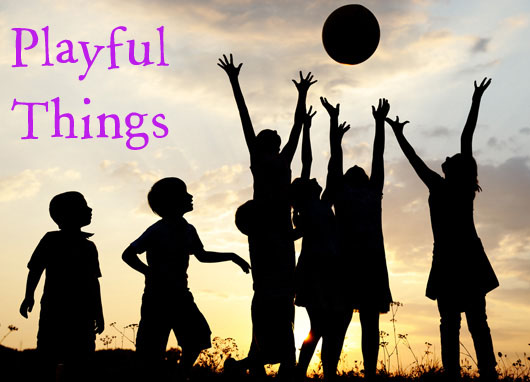I never planned to become an entrepreneur. I started Artella Land in 2002 as a fun hobby. It took off rather quickly, and I suddenly had a “business” on my hands. 13 years later, one of Artella’s main areas of service is inspiring creative entrepreneurs, and encouraging a more playful approach to work.
After all, in an entrepreneur’s busy life, it is easy to think of productivity and play as polar opposites, but when they come together, each becomes more vibrant. When we allow ourselves to feel playful, we connect to a sense of fun and flow, and what once felt like work becomes much easier. Similarly, when we bring a purpose to our play – when it becomes integrated into our business rather than just a mind-numbering activity at the end of the day – then we connect to our deeper sense of meaning in all we do.
Here are three easy ways to start using play to be more productive and creative:
1. Look at your relationships through a playful lens. Thinking of business meanings as play dates, and collaborators, team members, colleagues, and clients as playmates can enhance the productivity of business events and relationships. In the study of child development, different types of play are identified as being important, and these definitions can help us improve our business relationships. For example: rough-and-tumble playmates are those with whom you can toss and tumble with new ideas; celebratory playmates are there to be your cheerleaders and champions; belonging playmates know first-hand what you are experiencing and can normalize and empathize with your process; cooperative playmates work together to organize themselves in roles for a common goal. Even the perception of entrepreneurial competition can be reframed. It’s well documented that children need “parallel play” experiences, playful alongside others while remaining engrossed in one’s own activity. Try thinking of your competitors as parallel playmates, and see how this shift opens doors to new possibilities and potential.
Furthermore, just as children use imaginary friends to fill important roles or empty spots in their lives, entrepreneurs can create imaginary friends: individuals and idols – living or dead – who can step into the roles not be filled by your team or advisors at present. In your imagination or perhaps writing and sketching in a journal or planner, you can summon this group of imaginary friends to a board meeting of your business. Ask them about your current challenges, get their advice, and come away with new ideas for further exploration and implementation.
2. Use words playfully and powerfully. The words we use to describe our daily tasks and business goals hold a lot of power. You can shift the energy of any unsavory task by engaging in a bit of simple word play to change the word into something that makes you smile. My client Karen was procrastinating the task of studying a set of video tutorials, so I suggested renaming “tutorials” to become “tuliporials.” Having landed on this new name, she suddenly saw many possibilities: buying tulips to put by her computer; letting herself “tiptoe” through the material, going easy on herself rather than stomping through it; taking time to stop and smell each tulip as she went through the modules. The work itself didn’t go away – but the energy shifted to something that felt fun. Suddenly she was looking forward to the once-dreaded tutorials, and work felt a lot more like play.
Try this for yourself. Write down one word that sums up something you’d like to make more fun. See what other words you are reminded of. It helps to look for the rhymes syllable by syllable. For example, if I have an organizational project, some playful possibilities to transform the word “organize” include orcanize, which reminds me that yes, I can do this; orcansighs, which reminds me that this can be relaxing, and smorgasbordanize, which might mean laying it all out visually to show the deliciousness in its variety.
3. Add elements of play in your environment. We become more aware of the presence of play by having playthings around us. Give yourself a treasure hunt to find retired toys in thrift stores, garage sales, and sometimes even in your own drawers and closets. Paying attention to toys — and actually playing with them – focuses our minds to think playful thoughts, and perhaps revisit the kinds of toys we enjoyed as children. Our favorite toys or playful games as children offer many clues to the types of play that will help us most in our grown-up productivity. Think of toys you loved from your childhood and a message those toys might bring you today. Perhaps a memory of playing jacks might remind you of the importance of coordination, rhythm, skill building, and appreciation for design. A memory of a Tiny Tears baby doll might represent the importance of supporting the vulnerability of your clients and customers.
When it comes to the intersection of play and productivity, the secret is quite simple: what moves us is what moves us, which simply means what moves us emotionally is what moves us to action. This is why play helps us be productive. Play is many, many things, but it is never still, stuck, or stagnant; it somehow always moves. So when it comes to being more productive, play works.
********


